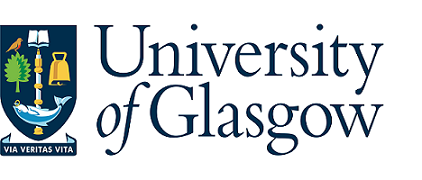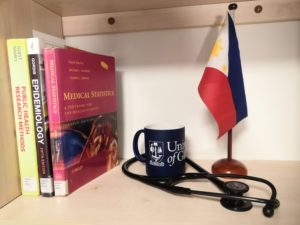- ...
Masters Compare - Find your perfect masters course.

 Before coming to the University of Glasgow, I was attending to patients on the wards, reading medical textbooks and articles, and running codes (advanced cardiac life support). Now I attend Zoom lectures, read on public health and statistics, and run codes in R.
Before coming to the University of Glasgow, I was attending to patients on the wards, reading medical textbooks and articles, and running codes (advanced cardiac life support). Now I attend Zoom lectures, read on public health and statistics, and run codes in R.
I’m a physician but I’m trading in my stethoscope for a year to be a PGT (postgraduate taught) student.
A Road Less Travelled
Unlike in countries such as the UK, Australia and India, medicine in the Philippines is a professional degree typically pursued after an undergraduate. Many if not most medical graduates will pursue specialty training as a resident (registrar in the UK) then maybe subspecialty training as a fellow.
Careers in medicine are generally thought of as linear: you complete one training after the other (with several licensure/certification exams) until you become a consultant. However, this is not always the case.
Going to graduate school is one option. It’s a road less travelled but it’s not unheard of either. In fact, several doctors in medical school faculty have postgraduate degrees – in clinical epidemiology, medical informatics, hospital administration and bioethics among others.
Why I’m Doing a Master’s Degree
While I do enjoy making rounds and seeing patients, there are other things I find worthwhile such as teaching. As I aspire to work in an academic hospital and be part of a medical school faculty, I think a master’s degree would be helpful in getting started.
Being a clinician is great because you leave an impact on individual patients and their families. However, I also realised that being a researcher has the potential of improving the lives of many more people. Many clinician-researchers in my home country have become my role models and learning about the work of others abroad through conferences and #MedTwitter has been inspiring.
As big data is transforming several aspects of society – healthcare included – I was drawn to the opportunity to gain skills and become data savvy. The Master of Public Health (MPH) programme at the Institute of Health and Wellbeing (IHW) provides the unique opportunity to do a specialism in data science. Scotland boasts a wide range of health data that researchers can access. Many of the IHW teaching and research staff are experienced with large datasets and linking routinely collected data.
Finally, doing non-clinical work such as teaching and research is also a break from demands in the hospital and the clinic. Doing alternative activities could help avoid burnout which is rampant among healthcare workers. 2020 was particularly difficult when the coronavirus pandemic broke out, and many of us decided to take a gap in medical training (“year off”).
How Graduate School is Different
It’s been a little over three years since I was out of medical school. Although we still had written and oral exams during residency — and even a specialty board exam afterwards — it has been a while since I was in full-time education. That’s to say that much adjusting is required. (I do have classmates who have been working professionally for much longer, and they have my respect for their eagerness to return to study.)
In medical school we were constantly reminded of being adult learners and the need for self-directed learning. Yet much of our preclinical years were still spent on didactics as we had to be familiar with the breadth of medicine. We sat through lectures in large halls from 8 to 5, and sometimes had small group discussions.
Being in a PGT programme is a bit more different – and especially in the present online learning environment. You’re expected to be much more independent, and contact hours are kept to a minimum. Lecture for one course is just typically about two hours a week. A course bearing 20 credits expects a student to spend 200 notional learning hours (!) that semester. That means that most of the week is totally up to you to plan out your self-study strategy.
They say that we millennials like to have structured learning environments and clear objectives. Thus, devising your personal timetable (schedule) and making good use of all the “free time” can be quite a challenge. (Thankfully, the university provides support on time management and effective learning through LEADS classes and modules as well as your assigned academic advisor.)
Now this may depend on the medical school curriculum, but if you were like me and were taught in weekly “modules” rather than concurrent classes, you will need to adjust your mindset with this scheme. In the first semester we take three credit-bearing core courses plus a research methods course. Each week typically has lectures and readings that go with a topical theme usually separate “essential” from “recommended” and “further” articles to help you prioritise.) You don’t study just one subject per week but instead need to compartmentalise your time and attention across the different courses.
The course content in graduate school, and particularly in the MPH programme, can be quite different from undergraduate and medical school. Although some topics may already be familiar (e.g., social determinants of health and epidemiologic study designs), others will require much more effort to understand such as statistical thinking and computing.
Some study techniques in medical school such as using mnemonics and reading handouts (or lecture transcriptions) will be less useful. As a master’s student we’re expected to spend more time reading and really understanding the topics. Also, assessments are different. While multiple choice questions were the norm in medical school and residency exams, be prepared to write essays with critical appraisals, and run statistical tests using R or STATA.
Apart from the academic aspects, shifting to full-time work to full-time international student brings about other day-to-day challenges. You will have to figure out what to eat and how to do your laundry which may be different from back home. Living in the UK might be much more expensive than in your home country (and I’m grateful to Chevening and #TeamUofG for providing me with a fully-funded scholarship). You will need to budget well for your living expenses as well as socialising and travel costs. While your student visa or biometric residence permit may allow you to work several hours a week, you might think twice about signing up for a part-time job once you feel the weight of your coursework.
The transition from physician to PGT student can seem a bit daunting. It’s no walk in the park (but walking through Kelvingrove Park to get to campus is always refreshing). Yet, I consider it one of the biggest adventures in my life so far. Getting to live abroad is a dream come true, learning new skills to advance my career is an important step, and meeting new people from around the world is a pleasant experience. Glasgow is a great city for students, and UofG is just magical.
Hear more from Postgraduate students at the University of Glasgow

A history of securing bright futuresThe University of Glasgow established in 1451 is the fourth-oldest university in the English-speaking world, and r...